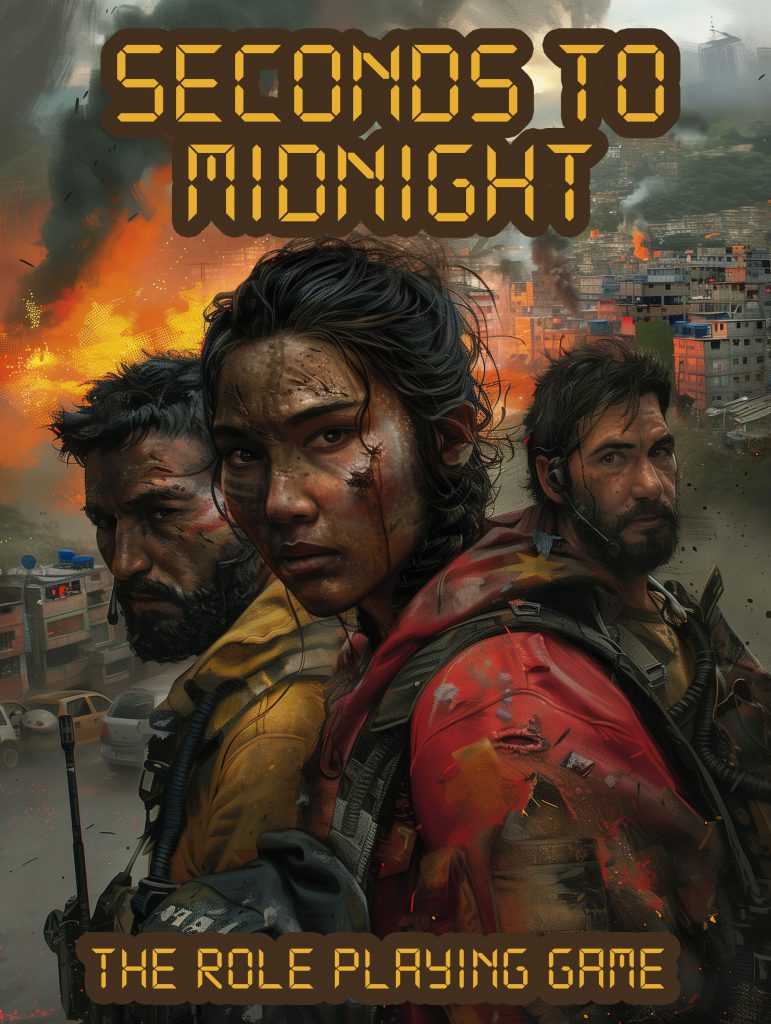Vajra Game Graveyard is a series of write-ups of games and game settings that we wanted to make, but that (most likely) will never be made. If you’re reading this and have a strong desire to help one of these dead game ideas become reality, email creative [aht] vajraenterprises [dot] com.
P.S. We don’t use AI generated art in our games, but we have just for the Vajra Game Graveyard series. You can read more about our position on AI generated art here.

Setting Concept
A game set in the same universe at Fates Worse Than Death, but earlier in the timeline. After decades of mismanagement of the globe by a few corrupt corporations, the world is on the verge of collapse. Environmental catastrophes, invasive genetically engineered organisms, increased wealth disparity, failing or failed governments and massive refugee populations are just some of the pressures on global society. Just one of the nearly constant disasters happening across the globe could start a chain reaction that could cause all of modern society to collapse. A large focus of the game will be on Africa, both as a place where people are suffering under many disasters and bad governments, but also as a place that could become the origin of a healthy and humane future.
Heroes
The heroes are “disasteros,” members of a global workforce who go from disaster to disaster, helping people out. When they happen to be working for the governments ruling these disaster zones they are called aid workers, when they happen to be working against them they get called criminals, spies, insurrectionists, profiteers and terrorists. Hero or outlaw, their skills at working in the midst of disasters are the only thing holding back the world from collapse.
Antagonists
Corrupt mega-corporations desperately holding on to power, global organized crime groups, corrupt and hostile governments, angry and desperate rioters, and various natural and manmade disasters.
Themes
Everyone suffering under the after-effects of the selfish decisions of a few. The psychological effects of a job that constantly exposes one to human tragedy. The innovation and resilience of informal economies. How a person doing the same job for the same reasons could be regarded as hero or criminal depending on whether they reinforce or threaten the power of the state. How the answers to how humanity can survive itself may come from developing economies and indigenous peoples.
Aesthetics
A thoroughly global world, with every ethnicity and culture being thrown together. The look and feel of favelas and other squatter-based communities. The smoke and grime and haze of a world half-ruined by pollution. A futuristic world, yet one where low-tech solutions abound. In some cases, a backsliding of technology, e.g. the return to text-only interfaces because of global internet bandwidth shortages. A clock (akin to the doomsday clock created by the Bulletin of Atomic Scientists) counting down to global catastrophe.
Mechanics
One could build mechanics that represent the dangers of working too hard and too long, and exposing oneself to too much human tragedy. “Relax” (the ability to rest without resorting to drugs or alcohol) and “warmth” (the ability to be in touch with one’s emotions, including those of empathy) could be two stats that players need to try to protect from damage.
Research Needed
Africa and the forces poised to help and hurt it in the future. Various types of bad governments and organized crime groups. Historical examples of governments that have failed or that have turned murderous. Various types of natural and human-made disasters.
Challenges
Hope has to be intermixed, otherwise the game might be so pessimistic and depressing that nobody will want to play it. To prevent the game from being played as “White Savior the RPG” players should be encouraged to play diverse characters from diverse backgrounds.
